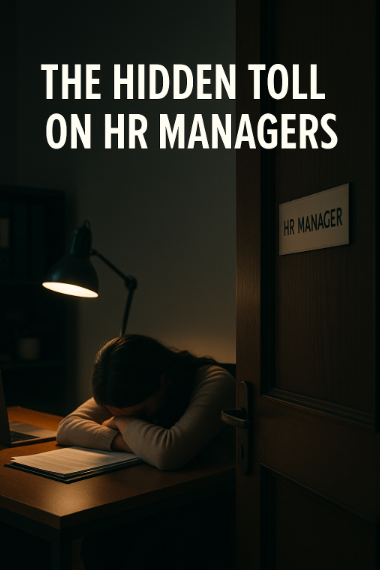The Hidden Burnout Crisis Among HR Professionals: Who’s Caring for the Workplace Caregivers?
When HR Carries the Weight: The Emotional Toll No One Talks About
Every company has them.
The quiet heroes who hold the emotional fabric of a workplace together.
They’re the HR Managers who stay late after a hard conversation. The ones who check in on an employee who’s been off their game. The ones who carry other people’s pain home, even when they’re told not to.
Most people don’t see it.
But this week I finally realized something I’d thought of before..
The Hidden Toll on HR Managers
This week, I was referred to an HR Manager trying to help an employee with a struggling teen and an elderly parent. Within minutes, I could feel how much she cared. But I could also feel the toll it was taking on her. I’d never looked at things from that perspective before. I sensed she was challenged by helping this employee. Not because she had to, but she wanted to.
Many HR professionals care deeply. Many are empaths.
This thoughtful and caring professional wasn’t sleeping.
She was anxious.
She felt helpless watching this family fall apart.
She told me she’d spent hours researching mental health resources for parents, trying to find somewhere to send them for real help. She wasn’t just doing her job, she was carrying it. Someone had suggested she talk to me.
Our conversation hit me hard. I’ve talked for years about how when your child struggles, you struggle as a parent. But I hadn’t thought enough about the emotional strain this places on the people trying to help from the sidelines.
One in Four Working Parents Face Mental Health Challenges
With one in four working parents in Canada having a child facing mental health challenges, HR Managers often become the unofficial crisis counsellors. They’re asked to comfort, guide, and protect, often without proper training or support.
They’re there when an employee breaks down in their office. They’re there when someone admits they don’t know what to do next.
And then they go home, trying to shake off what they’ve just absorbed.
There’s an unsustainability to that.
Companies risk losing more than just employees in crisis. They risk losing the HR professionals trying to hold everything together. Their burnout is real.
How The MentorWell Supports Working Parents and HR Teams
That’s where The MentorWell comes in.
We help workplaces support both the parents who are struggling and the HR professionals who are trying to help them.
Our LifeLine Education Series focus on:
Teaching working parents how to recognize early warning signs in their teens before it becomes a crisis.
Offering practical tools and scripts for having hard but important conversations at home.
Helping HR professionals understand how to listen with empathy, protect boundaries, and know where to guide employees for help.
Providing a trusted “Care Package” of resources for both HR teams and employees to keep after every session, so no one leaves wondering where to turn.
The goal is to create a proactive workplace culture, one where employees and HR professionals alike feel equipped, supported, and confident when life hits hard.
Why Early Support Matters in the Workplace
Once a family reaches crisis, the rules change. It becomes urgent, complicated, and expensive, both emotionally and financially. Early support doesn’t just protect the family, it protects the company too.
When parents know what signs to look for and HR teams know how to respond, people show up differently. There’s less shame. Less panic. More trust.
I often say this: you can’t outsource caring. But you can build systems that care better.
Building a Culture That Shares the Weight
Every organization needs to start now. The number of working parents facing mental health challenges in their families is climbing. And as more Gen Zs enter the workforce, many already navigating anxiety, depression, and burnout, the need for real, structured support is only growing.
Because when parents, employees, and HR teams all have a clear path to support, the entire culture shifts.
That’s how you build a workplace that truly cares.
But it doesn’t mean the weight of it should fall on a few key individuals.
Caring should be shared.
It should be built into the structure of how a company operates, not left on the shoulders of a few compassionate people trying to hold it all together.
Call to Action: Bring The MentorWell to Your Workplace
To learn more or book a workplace session, visit www.thementorwell.com. Let’s make mental health support in the workplace real, not reactive.


